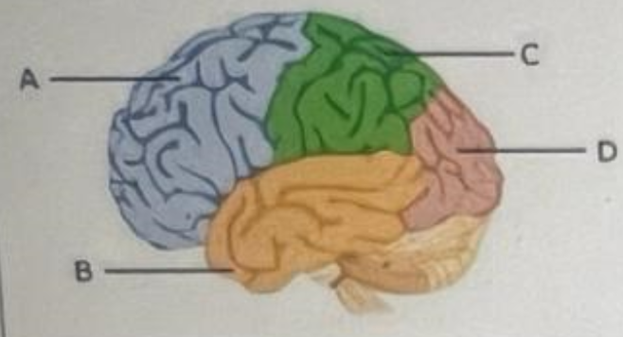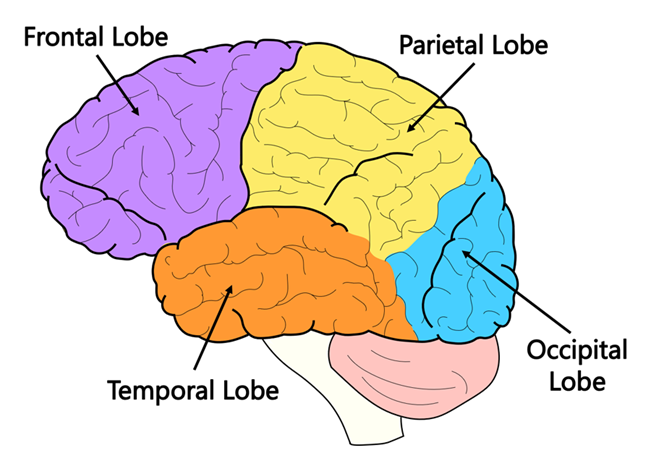A nurse Is preparing to care for a client with dysfunctions in the lobe of the brain labeled as "A". The nurse would expect to observe abnormal assessment findings with the following:

smell, hearing, memory, and emotional expression.
organization of thought, body movement memories, emotions, and moral behavior.
language generation, and visual interpretation.
taste, touch, and spatial orientation.
The Correct Answer is B
A. Smell, hearing, memory, and emotional expression:
Dysfunction in the frontal lobe typically does not directly affect sensory functions such as smell and hearing. Memory and emotional expression can be influenced by frontal lobe dysfunction, but they are not the primary functions associated with this brain region.
B. Organization of thought, body movement memories, emotions, and moral behavior:
This choice is the most accurate regarding frontal lobe dysfunction. The frontal lobe is responsible for higher-order cognitive functions, including the organization of thoughts, executive functions such as planning and decision-making, regulation of body movements, emotional regulation, and moral behavior. Dysfunctions in the frontal lobe can lead to deficits in these areas, such as difficulty organizing thoughts, impaired body movements (e.g., apraxia), emotional instability, and changes in moral judgment.
C. Language generation and visual interpretation:
Language generation is primarily associated with areas such as Broca's area, which is located in the frontal lobe but is more specifically related to language production and speech. Visual interpretation is more associated with the occipital lobe, which processes visual information. While frontal lobe dysfunction can impact aspects of language and executive functions related to visual tasks, these are not the primary functions typically affected by frontal lobe dysfunction.
D. Taste, touch, and spatial orientation:
Dysfunction in the frontal lobe is not typically associated with deficits in taste, touch, or spatial orientation. These functions are more related to other brain regions, such as the parietal lobe (for spatial orientation) and the sensory cortex (for taste and touch).

Nursing Test Bank
Naxlex Comprehensive Predictor Exams
Related Questions
Correct Answer is C
Explanation
A. Gamma-aminobutyric acid (GABA) and acetylcholine: GABA is an inhibitory neurotransmitter that helps regulate neuronal excitability. It is not typically implicated in depression. Acetylcholine plays a role in cognitive functions and muscle contractions but is not primarily associated with depression.
B. Glutamate and histamine: Glutamate is the primary excitatory neurotransmitter in the central nervous system, and its imbalance has been linked to various neurological disorders, but it is not directly implicated in depression. Histamine, known for its role in allergic responses and wakefulness, is not typically associated with depression.
C. Norepinephrine and serotonin: Both norepinephrine and serotonin are monoamine neurotransmitters that play crucial roles in mood regulation. Decreased levels of these neurotransmitters have been strongly linked to depression. Norepinephrine is involved in the body's stress response and arousal, while serotonin is involved in mood, sleep, appetite, and other functions.
D. Serotonin and acetylcholine: Serotonin, as mentioned earlier, is significantly implicated in depression due to its role in regulating mood and emotional states. Acetylcholine, while important for cognitive functions and muscle control, is not primarily associated with depression.
Correct Answer is D
Explanation
A. "The focus is on solving the patient's problems. Problems are discussed by the nurse and patient, and solutions are given by the nurse." This explanation highlights the nurse's role in problem-solving and providing solutions, which is characteristic of a therapeutic nurse-patient relationship where the nurse takes an active role in addressing the patient's needs and challenges.
B. "The focus of the relationship is socialization. Mutual needs are met, and feelings are openly shared." This explanation describes more of a social relationship where mutual needs are met, and feelings are shared openly, rather than focusing on problem-solving and addressing the patient's specific issues.
C. "The focus is the creation of a partnership in which each member is concerned with the growth and satisfaction of the other." While this explanation emphasizes a partnership and mutual concern for growth and satisfaction, it does not specifically highlight the nurse's role in problem-solving and providing solutions for the patient's problems.
D. "The focus is on the patient. Problems are discussed by the nurse and patient, but solutions are implemented by the patient." This explanation captures the essence of a therapeutic nurse-patient relationship, where the focus is on the patient's needs, and while problems are discussed collaboratively, the patient takes an active role in implementing solutions.
Whether you are a student looking to ace your exams or a practicing nurse seeking to enhance your expertise , our nursing education contents will empower you with the confidence and competence to make a difference in the lives of patients and become a respected leader in the healthcare field.
Visit Naxlex, invest in your future and unlock endless possibilities with our unparalleled nursing education contents today
Report Wrong Answer on the Current Question
Do you disagree with the answer? If yes, what is your expected answer? Explain.
Kindly be descriptive with the issue you are facing.
